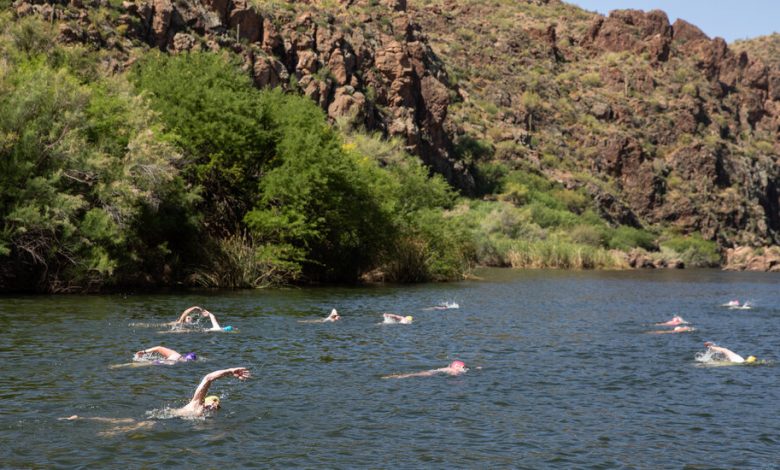An Unexpected Open Water Challenge: 40 Miles Across Arizona

MESA, Ariz. — On an 80-degree morning, a group of world-class swimmers stood in their Speedos and swim caps on a pebbly beach east of Phoenix.
They gathered on April 25 on the shore of Saguaro Lake to compete in the SCAR Swim, a four-day, 40-mile open water race across four lakes along the Salt River in Central Arizona: the Saguaro, Canyon, Apache and Roosevelt.
Kent Nicholas, the organizer of the event, doesn’t let just anyone participate. This year’s swimmers were in their 20s to late 60s, and each came with a résumé. The field included men and women who had swum successfully across the English Channel, Lake Tahoe, Monterey Bay, the Catalina Channel and around Manhattan.
The swimmers were jittery as they were divided into three heats and ferried on pontoon boats past a sign that warned, “Spillway doors may open without notice.” When that happened a year ago, athletes were forced to a sandbar to avoid being sucked backward. This year, conditions were perfect.
Through a megaphone, Nicholas, 56, ordered everyone off the boats and into the 55-degree water. Breathless from the shock of the cold, the competitors swam to a string of orange buoys in the shadow of a concrete dam.
While the world’s major channel associations forbid wet suits, and most ban smart watches, Nicholas allows both. But a purist ethic runs deep in open water swimming, and there was no neoprene in the SCAR Swim field. With one hand on the buoy line and the other in the air, Nicholas set the swimmers loose for a 9.5-mile swim to a dam on the far side of the lake.

Joe Zemaitis and Claire Russell on the pontoon after the Canyon Lake leg of the race. The patches on Russell’s parka represent successful marathon swims. Credit…Caitlin O’Hara for The New York Times
When they finished, they headed back to Mesa, Nicholas’s hometown, and stayed the night. The next day, the swimmers drove an hour to Canyon Lake for a nine-mile swim, immediately followed by a two-hour drive past ghost towns and copper mines to Apache Lake for a 17-mile swim that began at dawn on Day 3. The final swim took place the next night, a 6.2-mile swim on Roosevelt Lake.
For perspective, consider that the English Channel, the most well-known open water swim, is 21 miles.
With its marathon distance (about 40 miles), bone-chilling swims (the starting temperature on Apache was about 53 degrees Fahrenheit), dramatic scenery and road trip interludes, the event was honored as the World of Open Water Swimming Association’s event of the year in 2022.
It is a gathering of kindred spirits and a snapshot of Arizona that even locals may not have seen. The first three lakes still feel like the river they once were. Swimmers cut through languid, lime green water that wound between soaring red rock cliffs some 500 feet high and past massive mesas and eroding hills rooted with mesquite and saguaro. The desert was green and blooming. Turkey vultures and blue herons soared overhead. Families of bighorn sheep gathered on rocky ledges.
Nicholas, an Arizona-born criminal defense lawyer, first imagined the event while training in Saguaro Lake for his own 2011 crossing of the Catalina Channel. The next year, seven swimmers joined him at the first official SCAR Swim. This year, 58 swimmers arrived from 16 states and six countries. Thirty-eight of them were women.




That’s not an anomaly. Ever since the American Gertrude Ederle became the first woman to successfully swim across the English Channel in 1926, obliterating the existing Channel record by almost two hours, women have remained at the top of the sport.
According to Julian Critchlow, a marathon swimmer and data analyst who has analyzed every successful English Channel crossing since 1875, the average female finisher has been around 11 minutes faster than the average man. Women have a better success rate, too. No one has crossed the Channel more often than Chloe McCardel, a record she claimed from Alison Streeter in 2021.
“It’s interesting because if you think about ultrarunning or triathlon or long bike rides, men are going to move faster,” said Catherine Breed, who swam at the University of California, Berkeley, and once held the record for the fastest swim across Lake Tahoe. “But I do think women have more mental resilience and grit. We let the hard stuff flow through quickly, and keep going.”
Last year, Breed, 30, became the first person to swim from the Golden Gate Bridge to Half Moon Bay in Northern California, overcoming monotony and fatigue to complete the 27-mile route.
Last month, she finished second on the Saguaro Lake leg to Michael Rice, whose barrel chest and powerful arms hinted at his years of swimming butterfly at the University of Florida and Florida State, and some genetics, too. In 1999, his mother, Gail, swam the English Channel in 8 hours 12 minutes, one of the fastest times ever.
Rice was introduced to the SCAR Swim in 2021 after running into Sarah Thomas, the first swimmer to swim the English Channel four times in a row, at a spring-fed pond preferred by swimmers in suburban Denver. Thomas, who works as a recruiter, has an eye for talent. She chatted him up and trained with him. In the 2021 event, he was first overall, and she won the women’s draw, finishing second overall.
The 2022 overall winner, Steven Munatones, 60, finished Saguaro in third place last month, just over 11 minutes behind Rice. Munatones has dedicated his life to the sport. In the 1970s, he was a teenage reporter for international swim publications. In the 1990s, he won two U.S. Masters national championships in the open water, and he was among a small international cohort who helped get open water swimming into the Olympics in 2008, an effort that had continued since the 1980s.
In 2016, Munatones had a heart attack at home in Huntington Beach, Calif. His teenage son performed C.P.R. until help arrived. After years of recovery, he began dreaming of open water swimming again during the pandemic. He hadn’t swum more than a few thousand yards since 1994, but he registered for SCAR last year. He trained hard, perhaps harder than ever, and surprised himself and everyone else with the win.
“When you come back from something like I did,” Munatones said, “it’s all a bonus. At the end of every day I feel like, wow, I got another one in.”
Although the sun was warm, the water was brisk in Canyon Lake, especially for the first mile or so. A few people dropped out, but most persevered. They sipped electrolytes every 30 to 60 minutes to stay hydrated, and when their fuel tanks ran low they munched on Red Vines, black licorice, dates or chocolates; sucked energy gels or fruit purées; or downed shots of maple syrup. Swimmers stocked their own feed bags, managed by their kayakers, who paddled on the swimmers’ dominant breathing side and charted the most efficient line possible.
This year’s kayakers might well be next year’s swimmers, and vice versa, because open water swimming runs on generosity and reciprocity. Even Thomas was kayaking instead of swimming this year.
The fastest athletes covered Saguaro and Canyon Lakes in under three hours each. For Apache, they needed about five hours. The slowest swimmers required over five hours for the shorter swims and nine and a half for Apache.
Breed keeps her mind focused on form and body position. Munatones lets his scamper. Rice corrals the internal chaos with love, dedicating different portions of the race to people he cares about.
Nicholas greeted his swimmers at the finish line in what he called his “finishing boat,” a pontoon cruiser equipped with an enormous cooler of craft beer and quaffable wine and a much smaller one for athletic drinks and water. Rice and Breed cracked beers and waited for the rest of the field to come trickling in. Some finishers were skinny and shivering and others were built like tanks, with many variations in between.
“That’s what I love about this sport,” Breed said. “Every body — every physical type — is welcome, and you see people with a variety of body types excel at it.”
As athletes “hydrated” and soaked up the sun, training tips were shared and future events charted. Nobody cheered harder at the finish than Rice. He stood, clapped and hollered. Two down, two grueling swims to go.
“I’ve got to cheer them on,” he said. “They’re all great people, it’s a hard event and I want everyone to meet their goals.”




